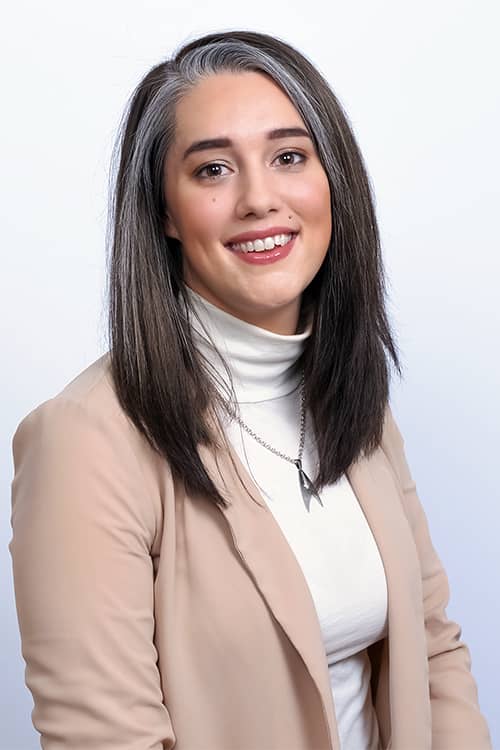
Alexis Graves, Ph.D. student, Informatics
Drives COVID-19 research
“Alexis’ background in information visualization has been a key resource for the National COVID-19 Cohort Collaborative (N3C, covid.cd2h.org) and our work in creating a first-of-its-kind patient data warehouse. Her work on the team science aspects of N3C will have great value in implementing future such environments.” – David Eichmann, Associate Professor Emeritus
• Hometown: Muscatine, Iowa
• Faculty mentor/advisor: Dr. David Eichmann, Director of SLIS
• What is your degree program and expected graduate date? Ph.D. Informatics — Information Science (2022).
• Please describe your research: To facilitate the generation and dissemination of vital COVID-19 health insights, the National COVID Cohort Collaborative (N3C) along with NCATS and other agencies overcame barriers associated with healthcare data sharing and created and harmonized one of the largest secure collections of COVID-19 health data. I have actively supported researchers associated with this initiative by engaging with local project management, search interface design support, and website and visualization design and implementation. I have also begun research into our science teams to gain insights that can be applied to better support their collaborations and help them more efficiently engage with the data.
• In simple terms, why does this research matter? In these unprecedented times, one is reminded of a quote from Fred Rogers’ Mother: “Always look for the helpers.” This initiative has brought together so many great minds from diverse disciplines who share the goal of supporting public health. So many exceptional individuals and institutions have collaborated to reduce the uncertainty surrounding this pandemic, bring together like and unlike minds to answer clinical questions, and create a resource and community whose positive impact has the chance to help drive collaborative science. Being able to better understand, enable, and support such a community can help aid future team science initiatives.
• How soon after starting at the University of Iowa were you able to participate in research? My journey at the University of Iowa began as an undergraduate, where I was provided many opportunities by amazing faculty and courses to engage in research in my later years.
• How has being involved in research made you more successful at the University of Iowa? The ability to gain hands-on experience in taking a problem or question from conception to solution through research helped me recognize that I was capable of tackling real-world problems. This helped give me confidence during my academic journey and helped shape my goals and aspirations.
• What are your career goals and/or plans after graduation? I’m hoping to apply my skillsets in the continued support of collaborative and efficient science.
• Does your research have connections to or implications for COVID-19? The N3C was created as a direct response to the COVID-19 pandemic after the leadership on our initial grant realized the need to pivot our efforts to provide researchers with the clinical data and support necessary to understand COVID-19. I hope my work can be applied to help these researchers better engage with the data, have more productive collaborations, and ultimately support their success in answering COVID-19 clinical questions.
Banner location: Downtown—Washington Street
